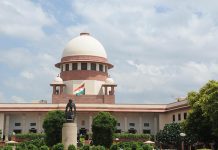New Delhi. The Supreme Court on Thursday reserved its verdict on the petitions filed by the Gujarat government against the early release of the convicts in the Bilkis Bano case.
Justice Beevi. A bench of Justice Nagarathna and Justice Ujjal Bhuyan asked both sides to hear the question of the validity of the remission order releasing the convicts in the case of the gang rape of Bilkis Bano and the murder of her family members during the post-Godhra riots in 2002. After that, the decision was reserved.
The bench ordered the Central and State governments to file records along with translations related to the release of the convicts by October 16.
Senior lawyer Indira Jaising in her counter argument said the apex court’s decision in the case would reflect the conscience of the Constitution.
Indira Jaising reiterated that the exemption orders were ‘bad in law’. He emphasized that the principles enunciated by the apex court should be applied in determining the application for early release.
He said the crime committed against Bilkis Bano was ‘motivated’ and the conscience of the country would be reflected in the apex court’s verdict.
In the previous hearing, he had argued that the crime committed against Bilkis Bano during the post-Godhra riots in 2002 was a ‘crime against humanity’ committed on the basis of religion.
In her counterarguments, lawyer Vrinda Grover questioned the release of the convicts by the Gujarat government despite non-payment of fine, which the Bombay High Court had ordered to be paid as compensation to the victim.
He argued that unless the fine is paid or the punishment is suffered in default, the convicts cannot come out on remission.
He also said that the convicts have been given ‘illegal premature release’.
After the final hearing began, the convicts approached the trial court in Mumbai and deposited the fine imposed on them to ‘mitigate the controversy’.
The Supreme Court had raised questions over depositing the fine without waiting for the outcome of his application filed before the apex court.
The court had asked the culprits, you ask for permission and then deposit it without getting permission?
The petitioner had said before the Supreme Court that the convicts had not paid the fine imposed on them and non-payment of the fine makes the order of remission of sentence illegal.
In another hearing, the top court had also said that it would need to investigate whether the remission applications of the convicts in the Bilkis Bano case were given any preference by the Gujarat government.
On the other hand, the convicts had argued that the remission orders granting them early release have the essence of a judicial order. This cannot be challenged by filing a writ petition under Article 32 of the Constitution.
Let us inform that 11 people convicted in the case were released on August 15 last year. The Gujarat government had allowed their release under its immunity policy. The culprits had served a sentence of 15 years in jail.









